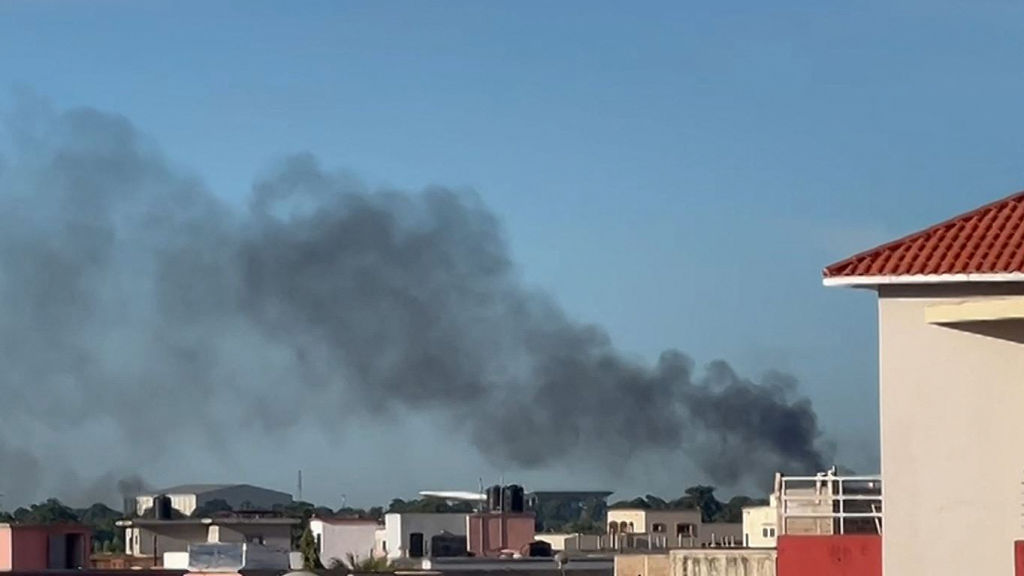ADF STAFF
When the al-Qaida-affiliated Jama’at Nusrat al-Islam wal-Muslimin (JNIM) attacked Bamako in September, it marked the first attack inside the Malian capital since 2016.
The attack on a military training school and international airport where Russian mercenaries are based killed at least 77 people, mostly young gendarmerie recruits. The terrorists also stuffed burning rags into the engines of presidential jets belonging to the ruling military junta.
Afterward, JNIM released a statement saying that the attack was a reprisal for “massacres and slaughters committed by this ruling clique and its Russian allies against our Muslim people.”
Wassim Nasr, a Sahel specialist and senior research fellow at the Soufan Center, told The Washington Post that JNIM’s choice of targets made it clear that the group had chosen to concentrate attacks in urban areas against Mali’s government and foreign forces.
The Bamako attack came after a July assault in which JNIM and Tuareg rebels struck a convoy carrying Malian Armed Forces (FAMa) troops and Russian mercenaries heading to the northern town of Tinzawaten, near the Algeria border. When the three-day battle was over, 47 FAMa Soldiers and 84 Russian mercenaries were dead.
Tuaregs traditionally are nomadic pastoralists, but fighters within the ethnic group have led a rebellion that Malian forces have struggled to contain for more than 12 years. They increasingly side with terror groups in battles with state and foreign forces.
Mali’s junta, led by Assimi Goïta, turned to Russia for support in 2021 after expelling French troops and United Nations peacekeepers from the country. The Tinzawaten battle accounted for Russia’s biggest loss in Mali since it deployed there and the worst defeat for FAMa since hostilities resumed in August 2023.
Daniel Eizenga, a research fellow focused on the Sahel at the Africa Center for Strategic Studies, told the newspaper that JNIM has shifted from “demonizing the French to demonizing Wagner” due to the Russian group’s heavy-handed tactics.
FAMa and Russian fighters are accused of committing atrocities against civilians. There were 924 civilian fatalities connected to Malian armed forces and Russian mercenaries last year — up from fewer than 100 in 2021, according to an Armed Conflict Location and Event Data (ACLED) analysis.
On October 21, a FAMa drone attack in the northern Timbuktu region killed eight civilians, including six children, and injured 15. Attaye, who witnessed the attacks, told Amnesty International that there were three drone strikes at midday. He said he was in his yard when he heard the first explosion at a local market.
“It killed several people, and the shrapnel injured several others,” said Attaye, a pseudonym. “The second strike targeted a vehicle belonging to a trader who had come to the market. The third strike also destroyed a vehicle. These strikes took place in the middle of the market and the victims were mainly people buying, selling or moving around.”
In late January, Malian soldiers searching for terrorists in the village of Ouro Fero in the Naro region went door to door and arrested 25 people, including four children. Villagers found their bodies later that day.
“We found the bodies on a hill, charred, bound by the hands, and blindfolded,” a 26-year-old villager who helped bury the bodies, told Human Rights Watch (HRW). “They had all been shot in the head.”
About three weeks later, a FAMa drone strike on an outdoor wedding celebration in the village of Konokassi in the
Ségou region killed at least five men and two boys and injured three others. Villagers told HRW that JNIM controls the areas around Konokassi, but none of their fighters were at the wedding.
As villagers tried to bury the bodies the next day, another drone attack at the Konokassi cemetery killed five men and two boys and injured six others.
Groups such as JNIM also have summarily executed civilians, looted and burned property, denied civilians food and aid, and committed sexual violence against women and girls. This leaves civilians unsure of who to trust.
“Whatever we choose is bad, wherever we go is to face suffering,” a man from Nienanpela, a village in the Segou region, told HRW. “The jihadists are brutal and have imposed their way of Islam on us, but the military and Wagner [fighters] who are supposed to protect us, what they do is only to kill, loot and burn.”

